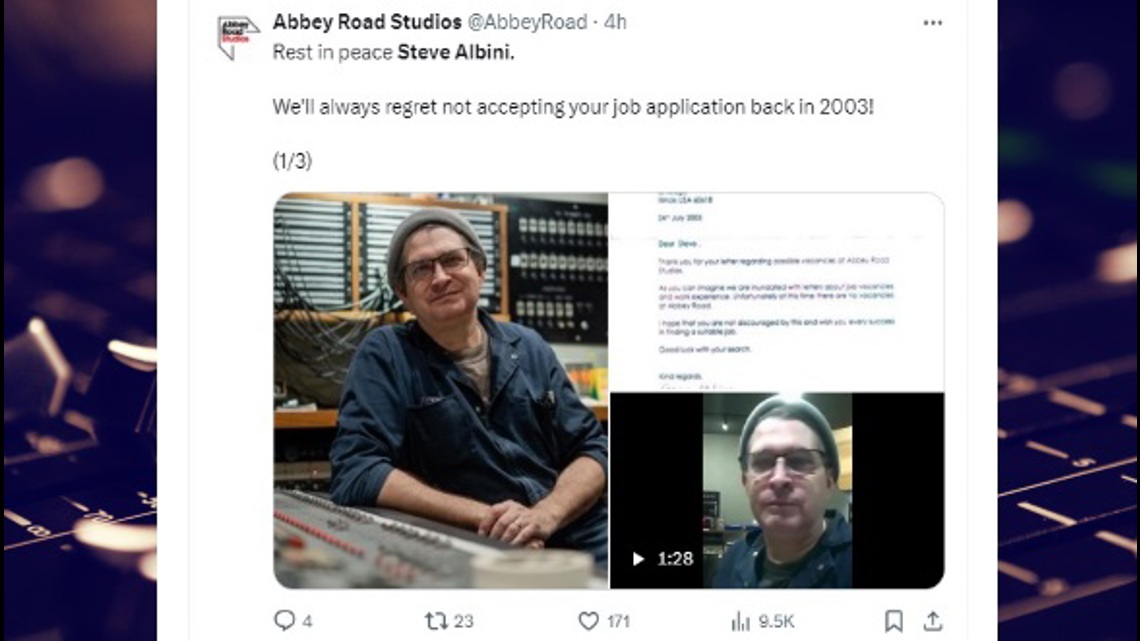
Albini, a musician, engineer and producer whose work helped launch indie rock bands, did a number of his recordings at Pachyderm Studios in Cannon Falls.
CANNON FALLS, Minn. — Steve Albini, an alternative rock pioneer and legendary record engineer/producer with at least one tie to Minnesota has died at the age of 61.
Brian Fox, an engineer at Albini's studio Electrical Audio Recording said the musician and studio wiz died after suffering a heart attack Tuesday night.
Albini shaped the musical landscape through his work with indie bands like Nirvana, the Pixies, PJ Harvey and more. He was at the helm when Nirvana's final album "In Utero" was recorded at Pachyderm Studios in Cannon Falls, yielding hits "All Apologies," "Heart-Shaped box" and "Pennyroyal Tea."
The unassuming studio tucked away in the southeastern Minnesota community was a great fit for both Albini and the bands he brought there, as there were few "outside" distractions. Musicians were able to concentrate on the material and their performances and get work done quickly.
In a podcast with comedian and talk show host Conan O'Brien, Albini and surviving Nirvana members Dave Grohl and Krist Novoselic recalled that there wasn't a ton to do during downtime and during a frigid Minnesota winter they didn't even want to leave the house and studio complex.
”This was in February, in the dead of winter, in the middle of (expletive) nowhere,” Grohl told O'Brien. “So even just the walk from the house to the studio, which was what – 100 yards if that – you risk frostbite.”
At one point, Albini made prank phone calls to musicians like Gene Simmons and Eddie Vedder, claiming to be a fictitious record producer.
In addition to his work on canonized rock albums like “In Utero,” the Pixies’ breakthrough “Surfer Rosa,” and PJ Harvey’s “Rid of Me,” Albini was the frontman of the underground bands Big Black and Shellac.
He regularly dismissed the term “producer,” refused to take royalties from the albums he worked on and requested he be credited with “Recorded by Steve Albini,” a fabled label on albums he worked on.
At the time of his death, Albini’s band Shellac were preparing to tour behind their first new album in a decade, “To All Trains,” which releases next week.
Other acts whose music was shaped by Albini include Joanna Newsom’s indie-folk opus, “Ys,” and releases from bands like the Breeders, the Jesus Lizard, Hum, Superchunk, Low and Mogwai.
Albini was born in California, grew up in Montana, and fell in love with the do-it-yourself punk music scene in Chicago while studying journalism at Northwestern University.
As a teenager, he played in punk bands, and in college, wrote about music for the prescient indie zine “Forced Exposure.” While attending Northwestern in the early ‘80s, he founded the abrasive, noisy post-punk band Big Black, known for its mordant riffs, violent and taboo lyrics and drum machine in lieu of a live drummer. It was a controversial innovation at the time, from a man whose career would be defined by risky choices. The band’s best-known song, the ugly, explosive, six-minute “Kerosene” from their cult favorite album, 1986's “Atomizer,” is ideal evidence — and not for the faint of heart.
Then came the short lived band Rapeman — one of two groups Albini fronted with indefensibly offensive names and vulgar song titles. In the early ’90s, he formed Shellac, the ferocious, distorted noise-rock band — an evolution from Big Black, but still punctuated by pummeling guitar tones and aggressive vocals.
In 1997, Albini opened his famed studio, Electrical Audio, in Chicago.
“The recording part is the part that matters to me — that I’m making a document that records a piece of our culture, the life’s work of the musicians that are hiring me,” Albini told The Guardian last year, when asked about some of the well-known and much-loved albums he's recorded. "I take that part very seriously. I want the music to outlive all of us.”
Albini was a larger-than-life character in the independent rock music scene, known for his forward-thinking productions, unapologetic irreverence, acerbic sense of humor and criticisms of the music industry’s exploitative practices — as detailed in his landmark 1993 essay “The Problem with Music” — as much as his talents.
Later in life, he became a notable poker player and apologetic for his past indiscretions.
“Ugh man, a heartbreaking loss of a legend. Love to his family and innumerable colleagues," wrote actor Elijah Wood on X. “Farewell, Steve Albini.”
Author Michael Azerrad, who included a chapter on Big Black in his comprehensive history, “Our Band Could Be Your Life: Scenes from the American Indie Underground, 1981–1991,” also posted on X. “I don’t know what to say about Steve Albini’s passing," Azerrad wrote. "He had a brilliant mind, was a great artist and underwent the most remarkable and inspiring personal transformation. I can’t believe he’s gone.”
Albini is survived by his wife, Heather Whinna, a filmmaker.
WATCH MORE ON KARE 11+
Download the free KARE 11+ app for Roku, Fire TV, Apple TV and other smart TV platforms to watch more from KARE 11 anytime! The KARE 11+ app includes live streams of all of KARE 11's newscasts. You'll also find on-demand replays of newscasts; the latest from KARE 11 Investigates, Breaking the News and the Land of 10,000 Stories; exclusive programs like Verify and HeartThreads; and Minnesota sports talk from our partners at Locked On Minnesota.
Watch the latest local news from the Twin Cities and across Minnesota in our YouTube playlist:
https://ift.tt/zrvjNKR
Entertainment
Bagikan Berita Ini














0 Response to "Recording legend Steve Albini dies, had Minnesota ties - KARE11.com"
Post a Comment